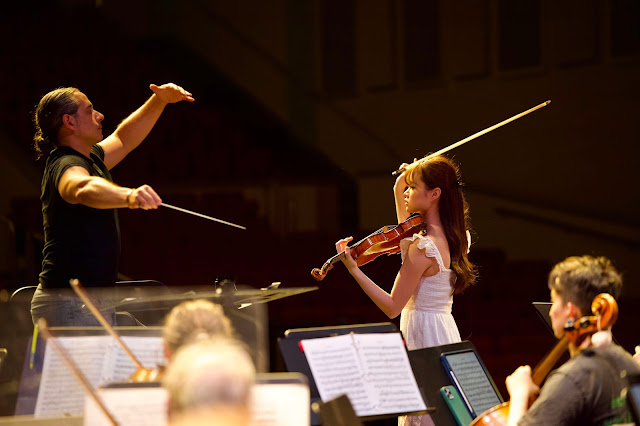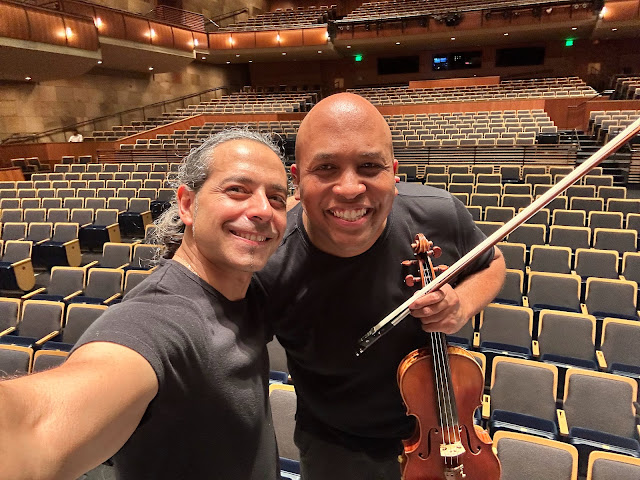On September 28, I will have the pleasure of conducting Brahms' Violin Concerto with Catherine Lin as our soloist with the Camellia Symphony Orchestra in Sacramento. Also on the program are Daniel Godsil's "Cathedral Grove" and Shostakovich's Symphony No. 1. Below is an interview with Catherine. (click here for ticket information)
Christian Baldini: Catherine, welcome, and let's start by talking about Brahms. What do you like the most about this concerto? Why is it special? What should people listen for in this piece?
Catherine Lin: Brahms is definitely one of my favorite violin concertos. It has a lot of beautiful melodies and lines between the solo violin and the orchestra. Why is this piece special? I think the most interesting thing and unusual thing is Brahms gives the orchestra a very strong role and, not just for the soloist. I highly recommend everyone to listen to the sixteen notes from the orchestra part in the first movement and the beautiful melody in the beginning of the second movement. All the themes can also be heard in the orchestra parts too.
CB: Let's talk about your beginnings with music. Growing up in Taiwan, how did you first encounter the violin? Did you play other instruments as well?
CL: First time I saw the violin was when I was three. My brother was practicing on his violin. I saw it and I told my mom I also want to play this instrument and she said, “Ok, only if you decide to make the violin as your career, otherwise you should just play the piano since I’m a piano teacher.” I was very excited and said yes! I will practice every day. Now, I feel very lucky that I made the right choice.
As for other instruments, as I mentioned, my mom is a piano teacher, so she taught me theory, piano and musicianship (like rhythm and solfège). So I know how to play piano and when I was in middle school, I also learned percussion for a year and that was fun!
CB: Who are some of your favorite composers? And favorite violin concertos?
CL: Paganini, Beethoven, and of course, Brahms. I like many violin concertos, such as Tchaikovsky, Sibelius and Glazunov, but if I have to pick one it will still be the Brahms violin concerto.
CB: Have you played a lot of chamber music as well? Is the experience different from playing as a soloist with an orchestra?
CL: Yes, I’ve played a lot! Playing chamber music is very fun, but it’s different from playing with an orchestra. The size of a chamber group is much smaller. Whereas orchestras have strings, winds and percussions. So they have much larger scale. For chamber music, I think discussion is more important than playing; you need to spend time discussing how to create good music and find compatible partners with similar music ideas.
CB: What's a day like for you? How much do you practice? Do you have hobbies? Do you exercise?
CL: I have a pretty busy life doing my schoolwork at San Francisco Conservatory of Music. I usually practice at least 3 to 4 hours on weekdays and practice more on the weekends. I like drawing and working out when I’m free.
CB: What is your advice for your musicians who are starting out? How does one deal with frustrations? How does one stay positive?
CL: listen carefully and practice slowly are my suggestions. Usually when I feel frustrated, I would find something I like to do like talking to friends or do something I enjoy to do like painting or playing with my cats.
CB: Thank you for your time Catherine, I look forward to making music with you!
CL: Thank you, Maestro for inviting me to play with you and this amazing orchestra!
 |
| Catherine Lin rehearsing Brahms with Maestro Baldini and the Camellia Symphony Orchestra |
Catherine Shin-Rou Lin, 21, was born and raised in Taiwan. She started playing violin when she was four and now she is currently an undergraduate student at the San Francisco Conservatory of Music, studying with Professor Chen Zhao.
Catherine has participated in several music festivals, including the Beverly Hills Music Festival, where she played for many professors such as Oleh Krysa, Margaret Batjer, and Tamara Chernyak. She also attended the Round Top Music Festival and the Bowdoin Music Festival these past few years. Additionally, Catherine has taken private lessons with renowned violinists such as Ilya Kaler, Nai-Yuan Hu, Keng-Yuen Tseng, Nancy Zhou, and Danny Tzu-Ti Chang.
In addition to her festival experiences, Catherine had a great time with the San Francisco Symphony Youth Orchestra in 2022, receiving excellent guidance from SF Symphony’s members and conductors.



.JPG)




.jpeg)
.jpeg)